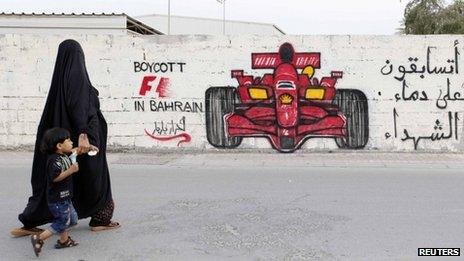Bahrain Crown Prince Salman addresses civil rights
- Published
Crown Prince Salman bin Hamad bin Isa al-Khalifa says progress is being made with regard to civil rights in Bahrain
Bahrain's Crown Prince Salman has addressed political and civil rights in the Gulf nation, on the eve of the Sunday's Formula One Grand Prix.
Bahrain has experienced more than two years of unrest and this year's race is taking place amid widespread protests.
Tens of thousands of anti-government demonstrators blocked a highway on Friday, calling for democracy. Clashes took place late into the night.
Activists have called for a further march on Saturday.
Pro-democracy protests led by the kingdom's Shia majority community erupted in 2011 and more than 50 demonstrators died in the subsequent crackdown by authorities. The unrest led to that year's Formula One race being cancelled.
'Zero respect'
In an interview with the BBC's Dan Roan, the crown prince made a distinction between peaceful protests and what he called "those pursuing terrorist activities".
"I must respect people's difference of opinion because that is what we are about but people who are willing to only have a unilateral view and who are using violence to impose it I have zero respect for."

Unrest on the island forced the cancellation of the 2011 Bahrain Grand Prix
The prince was asked about progress towards ending the conflict.
He cited the appointment of an ombudsman for the police, an ongoing national dialogue which he described as "moving, albeit slowly", and the fact that virtually all of the more than 4,000 people arbitrarily sacked in 2011 for supporting calls for democracy were now back in work.
But he said there was more to do with what he called "two pressing political concerns.
"One is civil rights, even more so in my opinion than political rights, and the second is law and order. And those two can be in opposition to each other or they can go hand in hand. I think it is my role to see how we can make them move in a more harmonious fashion."
Role for the prince?
Earlier this year the leader of Bahrain's main opposition group, al-Wefaq, called for the crown prince to attend talks aimed at ending the unrest.
At the time, Sheikh Ali Salman told the BBC that for national dialogue to be meaningful, the government had to show its willingness to offer "concrete solutions".
"We want someone who can speak for the royal family," he said.
Observers argue that behind the scenes there is a continuing power struggle between two factions in the family.
Crown Prince Salman is seen as a reformist in a court divided on how to respond to opposition demands.
Hardliners - centred around unelected Prime Minister Sheikh Khalifa bin Salman al-Khalifa, who has been in his post since 1971 - are said to be hindering the dialogue process.
They fear it will erode their power by offering concessions that will only serve to encourage more demands from opposition leaders they deeply distrust.
And since Saudi Arabia and other Gulf Cooperation Council (GCC) troops entered Bahrain in March 2011 and helped crushed the uprising, the prime minister has held the upper hand.
But the crown prince was recently appointed deputy prime minister by his father, King Hamad, and the Saudis are said to be growing increasingly impatient with Bahrain's inability to end the unrest - both signs that power may be shifting back to the crown prince.
Khalil al-Marzook, a senior Wefaq leader, was cautiously optimistic about the prince's comments on Friday but warned that "establishing the rule of law without civil and political rights is putting the horse before the cart".
Mr Marzook said that Wefaq agreed with the rule of law but one that was embedded in civil and political rights "[established] with the participation of the people. "
"We are ready to partner with the crown prince to establish this. His contribution to the dialogue would be welcomed," he added.
The opposition has stated repeatedly that without a senior member of the ruling family at the talks there is no possibility they will succeed.